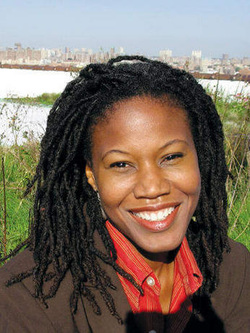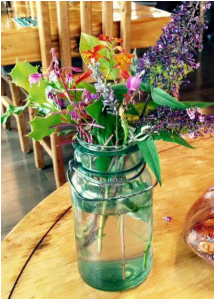
I had the distinct privilege of hearing Majora Carter speak at the AASHE (Association for the Advancement of Sustainability in Higher Education) 2011 Conference at Pittsburgh's David L. Lawrence Convention Center. This is one amazing woman, a fireball of wisdom and energy who is changing communities one by one. Majora lives in the Bronx - grew up there - and has worked with other community members to begin a transformation of the borough and of the lives of its residents. She is an eco-activist whose work and ideas are spreading across the globe. Check her out at these numerous sites to learn more about her and her work - I think she is a prophet for the day and I think you will be inspired. First, there is her award-winning TED Talk - Greening the Ghetto, where I first learned of her. Then - she hosts a public radio program, The Promised Land, in which she shares stories of visionaries and leaders. And, she has started a company, the Majora Carter Group - her vision, in her words:
“I believe that you shouldn’t have to leave your neighborhood to live in a better one... When we allow or encourage our economic practices to tax the environment, we inadvertently tax people too - that ends up costing all of us a lot of money. When we add the moral costs of denying future generations a clean and productive planet to the degraded quality of life offered our fellow citizens who are unable to escape the environmental sacrifice zones - zones created through our collective negligence - the toll becomes untenable... But when we place Democracy ahead of poorly regulated Capitalism in all of our decisions, cost savings - often overlooked by conventional thinking - cascade from many directions."
Regardless of your particular political affiliation, it would be hard to find fault with this woman's work - she engages under- and unemployed community members in productive work to better the natural and built environments in which they live, creating jobs as well as healthy and sustainable places to live - not unlike the Civilian Conservation Corps and other groups that built our nation's infrastructure decades ago. Majora Carter's existence gives me hope.
Before her talk, I browsed through the bookstore at the conference - and I watched author, professor, and environmentalist Bill McKibben talk with students and sign their books. I know that I am a little weird, but tears came to my eyes as I looked through the hundreds of books written to instruct, inspire, argue with people - to wake people up to what is going on around us, to the complicated but real connections between our economic and financial stability, our health and well-being, and the state of our environment, our natural world, across the globe. It gives me hope to see the energy that many very bright people are putting into creative and workable solutions to this state of affairs.
Backing up a little more... I spent the morning at the Allegheny Unitarian Universalist Church - had attended a couple of times before, and was feeling particularly drawn to stop in this week for some reason. On this Yom Kippur weekend of atonement and forgiveness, Holocaust survivor and American soldier Fritz Ottenheimer, German clarinetist Susanna Ortner-Roberts, and her husband, pianist Tom Roberts, presented a moving program - "Who are these Germans?"
Fritz's tales of his childhood in Germany during the early years of Hitler's reign depicted the challenges and horrors associated with lumping all people of one race, religion, or nationality together into one big glob - in his stories, there were cruel, awful Germans and kind, brave Germans and many more who were silent bystanders. In between his stories, Susanna's clarinet sang with mournful and soulful Klezmer tunes, accompanied by Tom's piano. Then Susanna spoke of her own emigration from Germany to the US, and of the desire of her generation not to feel guilt for the past atrocities which they did not commit, but to learn from them and to work to make the world a better place. Fritz and Susanna present their program to schools, churches, temples, community groups - anywhere people are interested in learning how to tear down walls and reach out to hold hands. I felt tears once again, and hope in my breast.
Julie spent her first Yom Kippur with Greg and his family. I think Michael and Leah were with her family in NYC. I love thinking about this time of year, this holy day, and am happy and grateful that my children are in relationships where they can learn about it. There are wonderful traditions that lead up to Yom Kippur, practices exemplified in the work of Fritz, Susanna, Tom, and Majora ... among them, charity - the ethical imperative to contribute our resources to support the needy, our communal organizations, and to make the world a better place; repentance - acknowledging our shortcomings, showing regret for what we did, and resolving to not make the same mistakes again; and prayer - opening our heart, putting thoughts to words, praying in the plural to ask for the good of all, not for our own personal needs.
It has been rainy today - wet brown leaves cover my front walk and there is the smell of wood smoke in the air. I have been listening to old Judy Collins albums - just read her book Morning, Noon, and Night: Living the Creative Life, written several years after her own recovery from her son's suicide and her own abuse of alcohol. She tells the tale of her son's death in Sanity and Grace, and of her own journey back to life and giving.
Out of darkness... music, light, and love.
And hope.



 RSS Feed
RSS Feed
